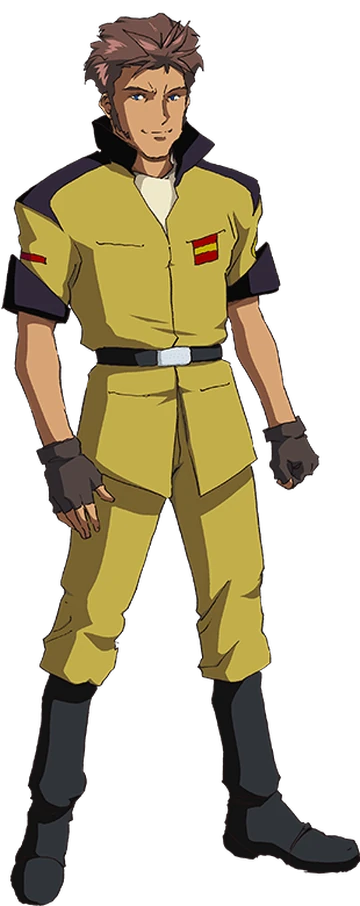Within the universe of Mobile Suit Gundam SEED, Andrew Waltfeld emerges as one of the most charismatic and complex characters in the series. Known as "The Desert Wolf," this ZAFT commander stands out not only for his prowess on the battlefield but also for his philosophy of life and the depth of his ideals. Unlike many of his contemporaries, Waltfeld is not merely a soldier of war; he is a strategist, a humanist, and a thinker who transcends the conflict in which he is immersed. His legacy extends beyond his military feats, influencing the perspectives of other characters and shaping the audience’s perception of war and morality.

The Master of the Sands
Andrew Waltfeld is the commander of ZAFT forces in the North African desert region, where he leads with a firm hand and undeniable charisma. Known for his combat skills and his use of the LaGOWE, a Mobile Suit specialized for desert warfare, Waltfeld proves to be a formidable opponent for Kira Yamato and the crew of the Archangel. His nickname, "The Desert Wolf," is not just a reference to his battlefield environment but also to his cunning and ability to adapt to any situation, overcoming the limitations of the terrain and utilizing unconventional strategies.
Despite his status as a ZAFT commander, Waltfeld is not a one-dimensional antagonist. On multiple occasions, he shows respect for his enemies and a deep understanding of war as a human phenomenon. His relationship with Kira Yamato is particularly intriguing; although they face each other in battle, Waltfeld does not see Kira as a mere enemy but as a young man with great potential whose vision is still in development.
Moreover, Waltfeld distinguishes himself through his leadership skills and ability to inspire loyalty in his subordinates. His companion and pilot, Aisha, is a testament to this, as she not only shares his worldview but also stands by his side in combat until the very end. Their dynamic reinforces the idea that Waltfeld is not merely a commander issuing orders but someone who fosters camaraderie and mutual respect within his team.
Beyond War
What sets Waltfeld apart from many other characters in the franchise is his philosophical approach to war and life. Unlike purely belligerent leaders, he does not fight out of hatred or blind loyalty to ZAFT but for a cause he deems just. His view of war is pragmatic and nuanced; he understands that it is not just about winning or losing but about what comes after the conflict.
One of the most memorable aspects of his personality is his appreciation for culture and gastronomy. His passion for coffee and fine cuisine humanizes him and distances him from the stereotype of a cold and ruthless military commander. For Waltfeld, these pleasures represent the beauty of life and the importance of maintaining one’s humanity even in times of war. This trait makes him comparable to characters like Char Aznable from Mobile Suit Gundam, who also possess a broader vision of conflict.
In one of his most revealing conversations, Waltfeld expresses his belief that Coordinators and Naturals can coexist, though the path to that coexistence is not easy. While he is loyal to ZAFT, he is not an extremist seeking the annihilation of Naturals but rather someone who recognizes the complexity of the conflict and the need to find balance. His ability to see beyond propaganda and understand the humanity of both sides makes him a unique character in the history of Gundam SEED.
The confrontation between Waltfeld and Kira Yamato marks a turning point in the series. Despite his apparent death following his battle with the Strike Gundam, Waltfeld survives, though gravely injured, and his resurgence in the second half of the series presents him from a different perspective. Now retired from the front lines, the former ZAFT commander chooses a more peaceful path, demonstrating that his ideals have evolved. His relationship with Murrue Ramius and the crew of the Archangel symbolizes his growth and his desire to find a solution beyond violence.
In his new role, Waltfeld becomes a key advisor for the forces striving to end the conflict. His experience in war allows him to understand the strategies of both sides and act as a mediator between the various factions involved. Although he remains a man of action when necessary, his priority shifts toward the pursuit of lasting peace.
Waltfeld represents a rare kind of leadership in the Gundam franchise—one based on mutual respect, pragmatism, and reflection. His legacy is not only defined by his skill as a strategist but also by his ability to challenge simplistic views of conflict. He serves as a reminder to the audience that war is not just a matter of good versus evil but a complex web of ideologies and aspirations.
Ultimately, Andrew Waltfeld is a symbol of the duality between war and humanity, a man who, despite being a soldier, never ceased to value life. His story invites us to reflect on the true costs of conflict and the possibility of a future where differences are resolved not with weapons but through understanding. Like the Desert Wolf, his legacy endures not only in the battlefield’s sands but also in the memory of those who seek a better world.


